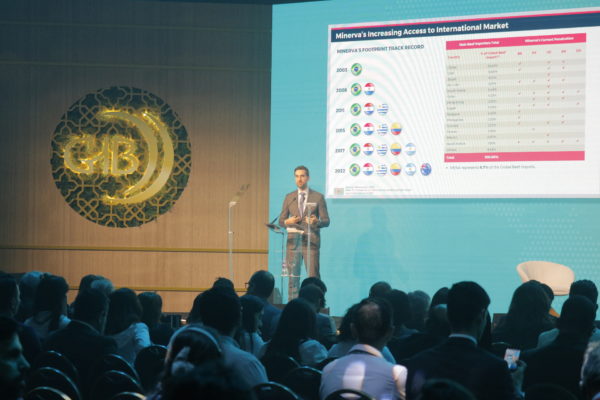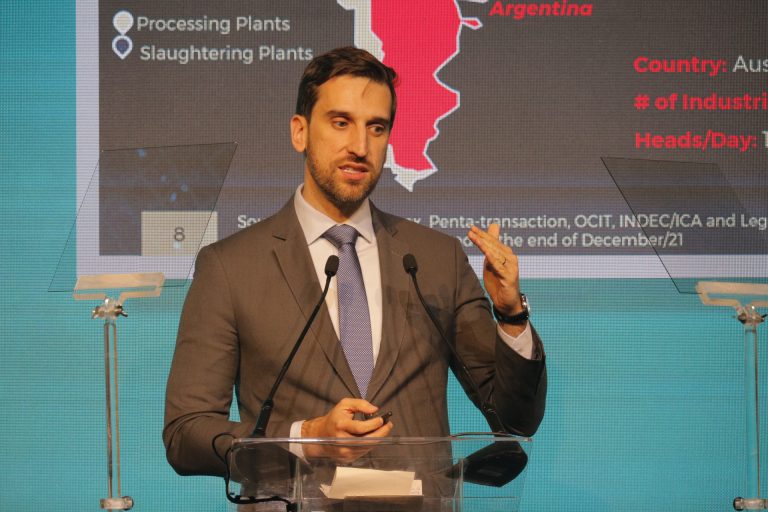São Paulo – Murilo Corral dos Santos, export director of Minerva Foods, said in his participation in the second edition of the Global Halal Brazil Business Forum (GHB) that the company’s commercial strategy aims at the Middle East market. The GHB is held by the Arab-Brazilian Chamber of Commerce (ABCC) and certifier FAMBRAS Halal.
Santos (pictured above) cited projections for the global halal market by the United States Department of Agriculture (USDA) to show that, from 2018 to 2024, both imports and consumer demand are expected to increase by 24% in the Middle East and North African (MENA) markets.

Saudi Arabia is expected to expand by 35% in five to six years, and the United Arab Emirates by 12%. Egypt could have a decrease in its consumption but a significant increase in its production. Still, the country has an import demand of around 32%.
In markets outside this region, such as the Philippines, 52% of beef consumption comes from imports. In Malaysia, the number is even higher: 96%. “We have the responsibility as a company to not only serve the Middle East and North African markets but also all halal markets worldwide,” said Santos.
In 2008, Minerva went public, seeking investors who believed in the company. Then, it had seven plants, six in Brazil and one in Paraguay.
In 2015, the company expanded to Colombia. At that time, it already had 17 plants — one for processing — and was in four countries: Brazil, Uruguay, and Paraguay, in addition to Colombia.
Today, Minerva has 30 plants, three processing plants, two in Argentina and one in Brazil, and a presence in six countries: Brazil, Paraguay, Uruguay, Argentina, Colombia, and Australia. The company considers geographic diversification a crucial aspect of its commercial strategy, as it can mitigate risks by not depending on a single market. “We have a business platform in six markets that allows us to reach customers worldwide with less risk,” said Santos.
Minerva currently can slaughter 30,000 heads of cattle in Brazil and 19,000 heads of lamb in Australia. Another noteworthy point, said the executive, is its international branch offices. The company was established 31 years ago and, in its third year, exported beef for the first time to the Lebanese market, where it set up its first branch office abroad. “And, in this same business model, we opened three other offices to cover the whole world.”
The strategy is to be close to the customer and have people who understand the local culture. According to Santos, knowing how to offer solutions to clients more sustainably is vital. The company’s CCO is based in Dubai, UAE, “one flight away” from any country and between Asia and Latin America, allowing full coverage of time zones, streamlining communication, and facilitating the transmission of information between the offices and countries where the company operates. In the MENA, it has offices in Algeria, Egypt, Lebanon, and Saudi Arabia, in addition to Dubai.
Year to date through September, the volume of halal products shipped to MENA increased by 12% compared to 2022. Excluding these markets, exports of halal products virtually tripled from 2021.
“Part of our responsibility is to look at Muslim markets around the world, not only in the Middle East and North Africa but also in Asia, Europe, and the Americas,” explained Santos.
The GHB is supported by the International Halal Academy, the Islamic Chamber of Commerce, Industry and Agriculture, the Union of Arab Chambers, and the Arab League, and held in partnership with the Brazilian Federal Government, Ministry of Development, Industry, Trade and Services, Ministry of Foreign Affairs, and ApexBrasil. Its sponsors are BRF, Marfrig, Minerva Foods, Laila Travel, Turkish Airlines, Brazilian Tourism Board (Embratur), Travel Plus, H2R Insights & Trends, World Logistic Passport (WLP), Bank ABC in Brazil, Seara, Pão & Arte, Cristal Plus, Pamunã Alimentos.
Translated by Elúsio Brasileiro




